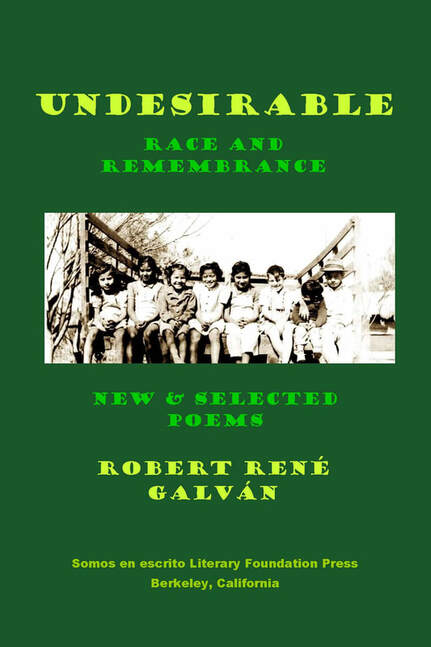- Book SEE
- >
- Undesirable
Undesirable
SKU:
UND1
$18.00
$18.00
Unavailable
per item
Undesirable – Race and Remembrance is a collection of poems by Robert René Galván, inspired by a boyhood raised in the heart of Texas, days spent between his folks’ home in San Marcos and family in San Antonio. René has a way not only of shaping the meaning of words but how he wants us to see and feel what he has seen and felt: in this book, his memories become ours.
Undesirable – Race and Remembrance is a collection of poems by Robert René Galván, inspired by a boyhood raised in the heart of Texas, days spent between his folks’ home in San Marcos and family in San Antonio. René has a way not only of shaping the meaning of words but how he wants us to see and feel what he has seen and felt: in this book, his memories become ours.
Born in San Antonio, he now lives in New York City, a noted Chicano poet and multi-talented musician. He is the product of a legacy fashioned by Galván’s antepasados who survived the Great Depression, the WWII years, the decades of discrimination and deprivation–a communal memory that he treasures and preserves in this book.
Galván tells of his elders riding on aging trucks to harvest a few dollars from the fields in the ’30s and ’40s, of his writer father filling his ink pen, its “barrel, incandescent as opal,” of the childhood home bought through a white friend so his family could buy it, even of the relentless reach of racism when recently a white man cursed him for being brown in a NYC supermarket.
The subtitle, Race and Remembrance, speaks to the dark undertones of the obras in his book; the cover hints at the seemingly fun trips his elders made from Texas to California to harvest the grapes, pick clean the beet fields, and whatever other crop farmers were hiring workers to pick.
Two recent poems by René have been nominated for the Pushcart Prize and one other for the Best of the Net competitions for 2020.
Born in San Antonio, he now lives in New York City, a noted Chicano poet and multi-talented musician. He is the product of a legacy fashioned by Galván’s antepasados who survived the Great Depression, the WWII years, the decades of discrimination and deprivation–a communal memory that he treasures and preserves in this book.
Galván tells of his elders riding on aging trucks to harvest a few dollars from the fields in the ’30s and ’40s, of his writer father filling his ink pen, its “barrel, incandescent as opal,” of the childhood home bought through a white friend so his family could buy it, even of the relentless reach of racism when recently a white man cursed him for being brown in a NYC supermarket.
The subtitle, Race and Remembrance, speaks to the dark undertones of the obras in his book; the cover hints at the seemingly fun trips his elders made from Texas to California to harvest the grapes, pick clean the beet fields, and whatever other crop farmers were hiring workers to pick.
Two recent poems by René have been nominated for the Pushcart Prize and one other for the Best of the Net competitions for 2020.

